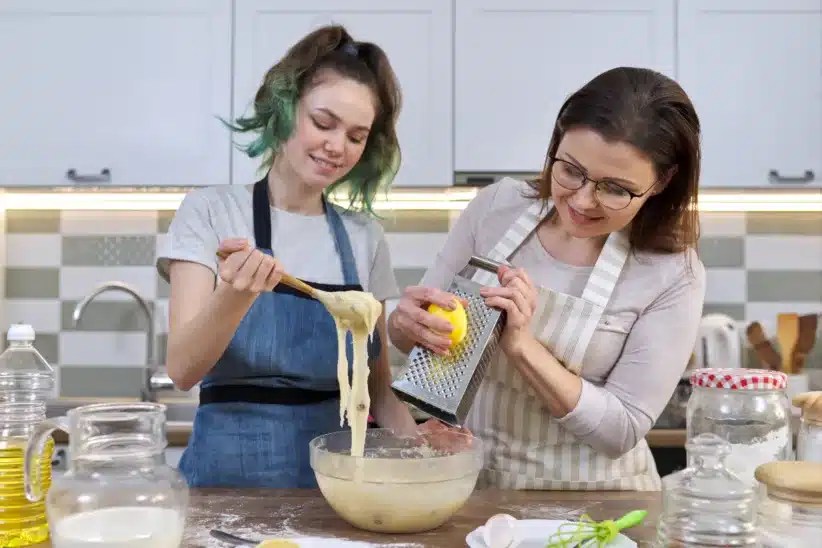For Valentine’s Day 2013, my 8-year-old daughter, Jessie, and I baked a pound cake for my wife, Mattie. I remember it well, because I’m not sure if the kitchen has recovered. I’m pretty sure I haven’t.
Egg slime ran down the cabinet. I fished eggshells from the batter. Flour dust covered the dish detergent bottle, faucet, and coffee pot. Jessie melted butter until it boiled over in the microwave. Luckily, I heard the splatter and stopped the microwave; three minutes remained on the timer.
Even a little bit of vanilla extract left on a teaspoon proved problematic. Jessie asked, “May I have it?” She made a face after she licked the teaspoon. Apparently, vanilla smells better than it tastes. Ten minutes later, Jessie complained of a bellyache. Little did I realize, my head would soon ache.
Jessie had used the hand-held electric mixer to stir the ingredients. I asked her to hand me the mixer, so I could make sure the batter was well mixed, but we had a poor exchange. Fumble! The mixer, turning at full speed, plopped into the bowl. Batter sprayed everywhere — my shirt, my pants, the wall, the sink, the coffee maker. Jessie avoided the erupting batter by running into the living room.
Had I remained calm, I would have unplugged the cord from the outlet, but one doesn’t think clearly while his kitchen, and self, are being painted in batter. I pulled the mixer from the remaining ingredients in the bowl, careful to not get my fingers caught in the spinning beaters and abruptly end my writing career.
Jessie came back into the kitchen as clean-up began. She retrieved a spatula to scrape the batter that blanketed the mixer back into the bowl. Surprisingly, enough batter remained, and before too long, the sweet aroma of pound cake filled the kitchen.
Next, Jessie wanted to help with the Valentine’s Day supper. She suggested that I cut the onions and chicken while she peeled the potatoes. After thinking, “I don’t have energy to clean up blood,” I gave her permission. As Jessie peeled the potatoes, she sang “Over the Rainbow.” As my fatigued head rested against the kitchen cabinets, my beautiful girl wished upon a star.
Jessie, now 11, still loves to bake, cook, and microwave. On a recent Saturday when Mattie was out of town, Jessie and I were watching my favorite college football team hold onto a one-point lead.
Jessie turned to me and said, “I’m hungry.”
I said, “I am, too.”
Jessie quickly responded, “I’ll make supper.”
Since my team needed me to cheer it on, I said, “Okay, but don’t burn down the house.”
Jessie cut a hard-boiled egg in half and delivered it in a glass bowl. Then she heated a can of chicken soup on the stove and served it. All was going well, but then I picked up an all-too-familiar scent — the smell of something burning. I opted to run to the kitchen and forget about my team nursing its one-point lead.
“What’s burning!?”
“Everything’s okay, Dad. Please don’t look.” Jessie likes to surprise me. Trust me; if I smell something burning, I’m going to look.
Jessie had over-microwaved two cookies. She served me the blackened one with a scoop of mint chocolate chip ice cream on the side and covered the burnt cookie with chocolate syrup and white chocolate morsels.
As I enjoyed my dessert, I asked Jessie, “Did you turn off the stove?” Jessie ran into the kitchen.
I heard the stove knob click, followed by, “It’s off now.”
My team held on for a one-point victory. When I read the sports page the next morning, the kitchen still smelled like burnt cookie.
What did I learn from these experiences? Wear an apron … always. Chocolate syrup is a good condiment for burnt desserts. Although I enjoy college football, I cherish living in my house more.
Most importantly, I must continue to let Jessie try things, so she can grow — but with supervision.
I don’t know what Valentine’s Day 2016 will bring, but I plan to keep a scented candle on hand. If I don’t use it to mask the smell of burnt food, it can always provide a romantic ambience for my valentine.
Until next month, remember to cherish the moments. Happy Valentine’s Day!
Patrick Hempfing had a 20-year-long professional career in banking, accounting, and auditing before he became a father at age 44. He is now a full-time husband, stay-at-home dad, and writer. Follow him at www.faceb





















